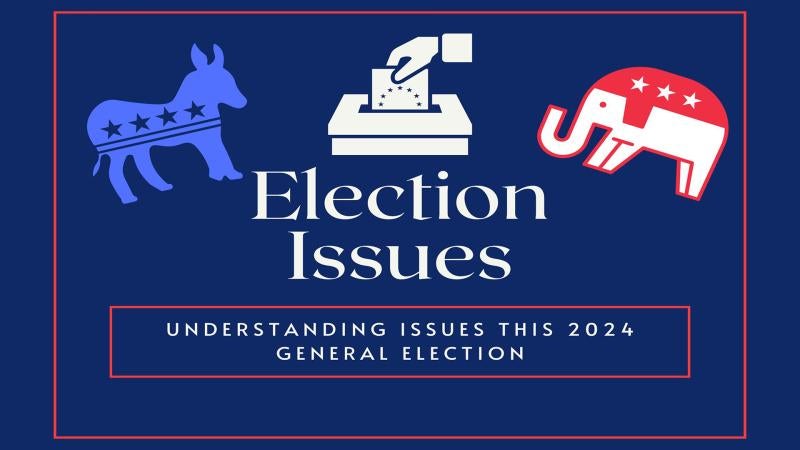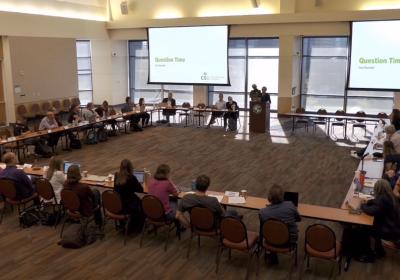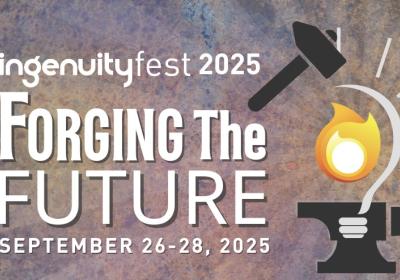
Key issues on the ballot in the 2024 election
Every election cycle, during their campaign candidates from each party outline policies on specific issues that they deem to be important. Some issues are on the ballot every year, while some become more or less important through policies enacted during a candidate’s time in office.
For CSU students, many of whom may be voting in their first general election, it’s important to know what the key issues are and the political candidate’s stance on each issue. By knowing the issues and the stances of each campaign, you can vote for a candidate that aligns more with your beliefs and interests.
This election cycle, U.S. voters are concerned with a few key issues going into the Nov. 5 general election. Those issues include abortion, the economy, border control and the wars in Ukraine and Gaza.
Kamala Harris and Donald Trump offer very different visions for the country -- from reproductive rights to economic issues, foreign policy, and existential questions about the future of American democracy and the planet.
Abortion
In 1973, the U.S. Supreme Court made a historic ruling in Roe v. Wade that the Constitution upheld the right for people to have an abortion. At the time, this ruling began to override abortion bans throughout the country, making it a federal issue.
For decades most sides saw this as settled law. But in recent years republicans and democrats began to argue over the ruling since the Supreme Court decision was not followed by legislation codifying SCOTUS' position. Anti-abortion leaders sought to restrict abortion or overrule Roe. v. Wade while pro-choice leaders worked to uphold the court case, codifying it into law.
For nearly 50 years, Roe v. Wade was the standard when making abortion legislation, but there was still not a piece of legislation that was passed to make it law. In 2022, a sharply different Supreme Court to that of 1973 overruled Roe v. Wade, giving each state the right to make its own laws surrounding abortion.
Certain states allowed the people living there to vote on abortion laws and whether or not to uphold the same standard that Roe v. Wade set. However, some states, like Texas, did not allow citizens to vote on the issue and the state government passed their own legislation.
The abortion topic is not being discussed from either side as a federal ban, but it is being discussed as whether to leave it to each individual state or a standard for the entire country.
If elected president Kamala Harris has vowed she would veto any nationwide abortion ban. Donald Trump has said abortion access should be left to the states, and has vowed that as president he would not sign a national abortion ban.
The Economy
The economy is another issue every election cycle, due to the constant rising and falling of inflation. In the past four years, inflation has been a talking point as many people struggle to buy food and other household necessities.
However, inflation is high due to the pandemic in 2020, which left high levels of job vacancies and unemployment in the U.S., alongside new taxes on imports and exports.
- Taxes
Taxes are a mandatory payment that help to fund government spending and public services. While taxes have increased, the largest tax cuts have gone to people of higher-income, while people of middle and lower income have paid more for their share.
For many, the issue surrounding taxes is how to create larger tax cuts for lower-income brackets so that they are not paying as much. As of the present, some of the tax cut legislation currently residing over the U.S. is former President Trump’s from 2017.
- Housing
With the high cost of everyday items, comes the cost of housing. Due to many people looking for homes, there is a housing shortage that is causing down payments, mortgages and rent to go up since it is in high demand.
The argument surrounding this election is to either invest in new housing and build more homes on federal land (Republicans), or invest into housing that already exists and make it more affordable (Democrats).
- Tariffs
Tariffs are taxes imposed by the government on the imports and exports of goods from another country alongside the U.S.
The taxes associated with these tariffs can cause the prices of everyday items to rise. Part of this is due to less U.S. manufacturing jobs and a competitive market in China, since labor is cheaper there.
With how the U.S. is currently operating in manufacturing, large tariffs on these goods would cause higher inflation, about 2% higher than now, especially if countries respond the same. This could cost millions of Americans more money, roughly $4,000 each year.
- Social Security
Another economic issue is social security and how it is funded. Social security is an organization that helps support Americans who are older, retired, on disability, etc.
Many Americans are worried that funding will not be expanded and could potentially shrink. This would mean less money for people surviving off of government assistance, making it harder to live within their means.
A report from the nonpartisan nonprofit Committee for Responsible Federal Budget found that both Harris and Trump will increase the national debt to pay for their economic initiatives. Harris' plan would sink the U.S. another $3.5 trillion into debt, while Trump's economic plan would cost double that, sinking the nation a further $7.5 trillion into debt.
Border Issue
Migration at the U.S.-Mexico border has had higher numbers over the last decade, with a large quantity of the migration crossings being illegal. Many Americans are concerned with the high numbers of people crossing, without knowing their background in their home country.
As of January 2024, more than 7.2 million migrants have crossed the border illegally since January 2021. However, those migrants are ones that came into contact with U.S. officials, not the population of migrants that have entered the U.S.
Since June of 2024, migrant crossings have reached a low since 2021 due to an executive order made by President Biden. Along with the order, Biden closed the largest immigration detention center in southern Texas.
The U.S. government is looking for a way to strengthen the border for less migrants to come in illegally, and also make a better process for people to acquire citizenship. This would allow for better background checks on migrants coming into the country and seeking asylum.
In February 2024, a bipartisan border bill was created to solve the border crisis. President Biden signed the bill which made it harder for immigrants to get into the United States, but Republican Senators did not sign the bill.
Harris has laid out a plan to enact stricter penalties for people who attempt to game the asylum system and called for comprehensive immigration reform, including pathways to citizenship for undocumented people, especially those who were brought to the U.S. as children.
Trump has promised mass deportations, restricted entry to the U.S., a travel ban on several Muslim-majority nations and an end to the federal protection of many migrants already in the U.S. seeking lawful status.
War in Ukraine and Gaza
The U.S. is currently funding the wars in Ukraine and Gaza by sending money to its allies. The United States funds Ukraine in the war against Russia and funds Israel in the war in Gaza.
- Ukraine
The United States has supplied Ukraine with military, economic and humanitarian aid since Russia led a full-scale invasion in February 2022. While Ukraine is not a part of NATO, its allies have said that the future of Ukraine is in NATO.
Since the start of the invasion, the U.S. has given Ukraine over $150 billion. The money has gone towards the war and military spending in Ukraine, while also funding humanitarian efforts in the country.
The U.S. has provided aid as a way to fund Ukraine, but also to strengthen their position if Russia decides to negotiate peace. Some believe that by not helping in the war, Russia could win, allowing for more invasions of other countries.
Many Americans are unsure of the spending towards Ukraine, and want quicker solutions to end the ongoing war.
- Gaza
Since Oct. 7, 2023, the U.S. has given Israel $17.9 billion in military aid towards their attacks on Hamas. Since that particular conflict started, the Israel Defense Forces have carried out many different attacks on the Gaza strip, with some places occupied by civilians.
Israel has carried out these attacks to force Hamas to release Israeli hostages. In the process, the IDF has killed over 41,000 Palestinians, mostly women and children as reported by Palestinian health authorities.
Many people in the U.S. and around the world are asking for nations to call for a ceasefire between Israel and Hamas. The ceasefire will stop the attacks on Palestine and release the Israeli hostages.
Continuing the Biden administration's policy, Harris has pledged unyielding support for Ukraine as it battles to repel Russian forces from its territory. She has been broadly supportive of the current administration’s approach to Israel’s widening war.
Trump says he would end the Ukraine-Russia war on his first day in office, but not explained how he intends to do that. He has championed Israel's right to defend itself, and domestically has advocated for a tougher response to pro-Palestinian protests, suggesting he would strip foreign students of their visas if they express antisemitic or anti-American sentiment.
Democracy and Project 2025
- Democracy
On Jan. 6, 2021, there was an attack on the U.S. Capitol, led by insurrectionists in support of President Trump. The attack temporarily prevented Congress from counting votes by the electoral college that eventually elected Biden as the new President of the United States.
Trump had stated that the “election was stolen,” and that people needed to “fight.” The insurrection is described as a self-coup d'état, threatening a peaceful transition of power to President Biden.
Trump has called the insurrectionists “patriots,” in his speeches since Jan. 6, 2021. He is currently facing indictment for his attempt to overturn the 2020 election.
Harris, a former prosecutor, views Trump as a direct threat to democracy, pointing to the events surrounding his refusal to accept defeat in 2020, and the multiple legal cases he now faces due to his and his allies' attempt to prevent Biden's ratification as president.
- Project 2025
Project 2025 is a presidential transition project created by The Heritage Foundation and published in 2022. The project is a guide for the U.S. government to enact conservative and right-wing policies.
The project would replace many people in the federal government and give their jobs to loyalists of the president, meaning the entire executive branch would be under the power of the president.
Along with the conservative and right-wing policies, the government would also implement Christian nationalist ideas. These ideals include banning abortion, removing protections against gender identity and sexual orientation, prosecuting those who send and receive contraceptives, and criminalizing pornography among others.
While the many people associated with Trump are a part of the project, Trump has stated he is not a part of it and has nothing to do with it.
In her debate with Trump Sept. 10, Harris linked him directly to Project 2025, saying "What you're going to hear tonight is a detailed and dangerous plan" that the former president "intends on implementing" if he were elected again.
Climate Change
Climate change is being discussed as a way to prevent the global climate from shifting, and ultimately rising in temperature. Since scientists started recording global temperature in 1850, the global temperature has consistently been on the rise.
The year of 2023 was the hottest year ever recorded post-industrial era, with an average global temperature of 14.98 degrees Celsius. Many factors contribute to this including burning fossil fuels, cutting down forests and the processes included in manufacturing goods.
The temperatures rising because of climate change contribute to natural disasters like wildfires, droughts, hurricanes, etc. These not only affect humans directly through weather, but they also disrupt ecosystems, potentially harming food chains that would affect humans in the future as well.
Both sides of the political spectrum feel completely opposite when it comes to climate change. Democrats believe it is an issue we need to take seriously by banning processes of fracking, drilling for oil, regulations on pollution, etc., while Republicans feel it’s not a pressing issue and will continue these processes.
Harris has said that the climate crisis is the result of human activity and represents an existential threat to the U.S. and the planet. Trump has questioned established climate science, at times dismissing the climate crisis as “mythical” and an “expensive hoax.”














